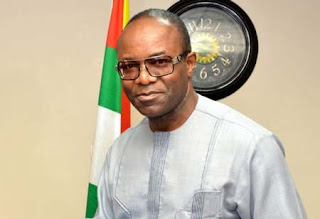 |
| Emmanuel Ibe Kachikwu |
Nigeria’s
minister of state for petroleum, Emmanuel Ibe Kachikwu, said today (Wednesday
13th January) that Nigeria will not reduce her crude oil production
level even though the country is facing plunging crude oil prices caused by global
supply glut at the international market.
Nigeria economy had
since shrunken due to the slump in the oil prices. With crude oil accounting
for about 90 per cent of the country's export earnings and 70 per cent of
overall government revenue, there is no far fetch reason why the country should
arrive at such decision; the continuous fall in prices is having adverse
effects on the country’s revenue.
US crude oil
prices tumbled to a 12-year low at USD 30 on Tuesday, this have thus, prompted
OPEC member Nigeria to call for an emergency meeting of its member countries to
address crumpling crude oil prices that have sapped the treasuries of Nigeria.
Nigeria minister
of state for petroleum, Emmanuel Ibe Kachikwu said in Abu Dhabi, he expected an
extraordinary meeting of OPEC, the global oil cartel in early March to discuss
the continued crash in oil prices.
Finding solutions
to the current challenge facing the sixth largest Africa’s crude oil producing
country, Nigerian National Petroleum Corporation (NNPC) marketing head Mele
Kolo Kyari said, Nigeria can do little in response to the collapsing price of
crude.
Talking with AFP
in Abuja, he said "Nigeria cannot stop the prices of crude from going
down.
"The
easiest thing to do is to control production but Nigeria can only do that
through the OPEC framework and the last OPEC meeting did not agree to cut down
production.
"So
influencing the price through production is now out of the question."
It can be
recalled that Saudi-led Gulf exporters within the Organization of Petroleum
Exporting Countries (OPEC) have so far refused on cutting production to check
nose-diving oil prices. Their refusal is based on the singular fact that they
are seeking to protect their own market share despite a heavy blow to their
revenues.
But until the
meeting is formally confirmed, Nigeria can do little in response to the
collapsing price of crude, said Nigerian National Petroleum Corporation (NNPC)
marketing head Mele Kolo Kyari.
Comments
Post a Comment
Be free to make your comment!